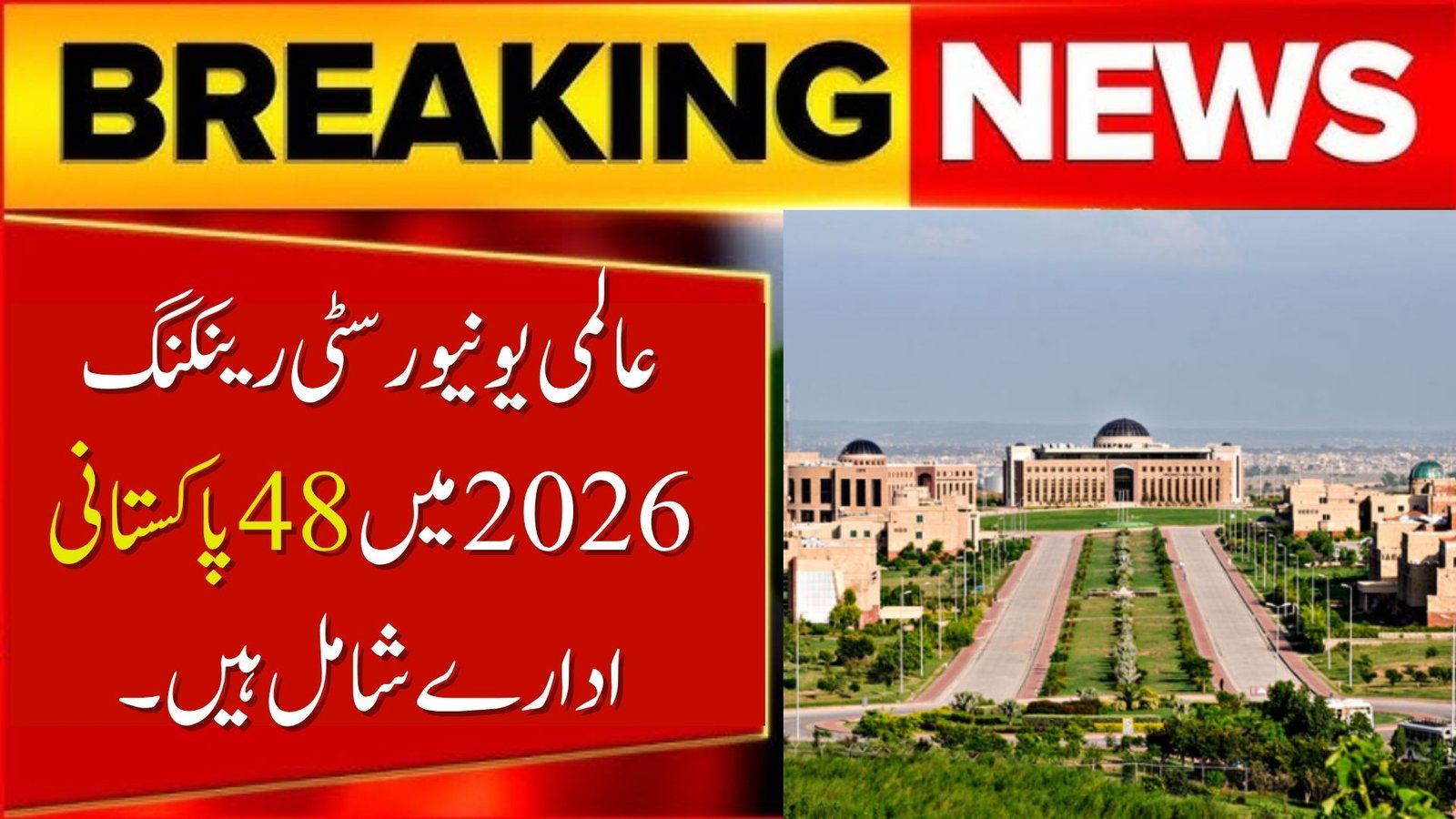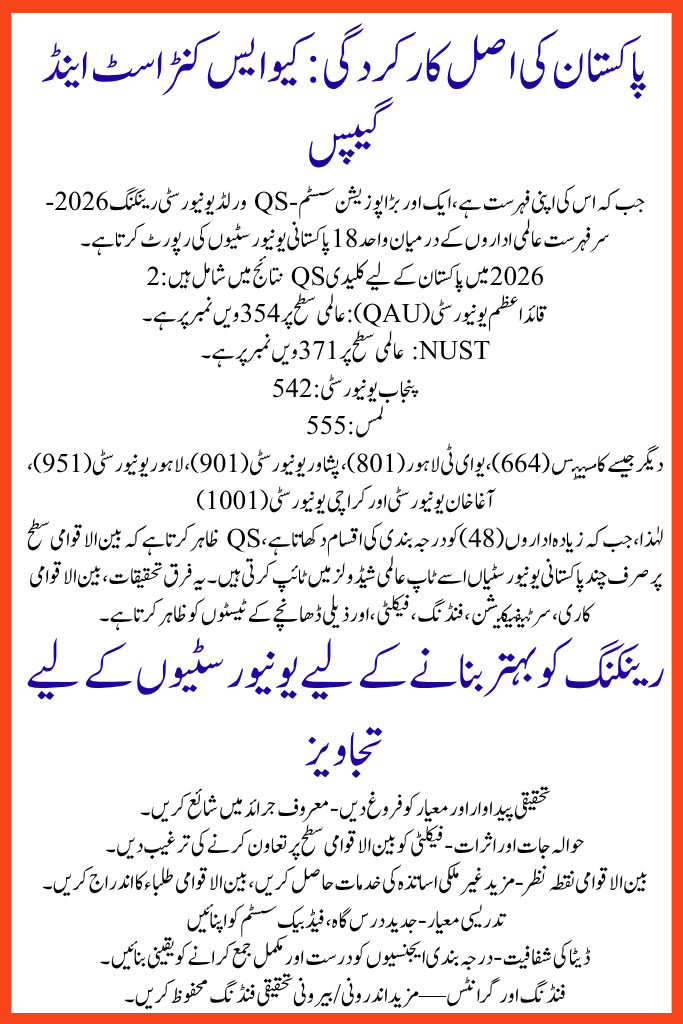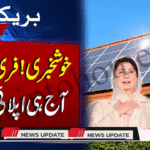48 Pakistani Institutes Included in World University Rankings 2026

48 Pakistani Institutes Included in World University Rankings 2026
| Field | Detail |
|---|---|
| Ranking System | Times Higher Education (THE) World University Rankings 2026 |
| Total Universities Ranked Globally | 2,191 from 115 countries |
| Pakistani Universities Participated | 99 |
| Pakistani Institutions with Formal Rank | 48 |
| Ranking Ranges | e.g. 401–500, 601–800, 801–1000, 1001–1200, 1201–1500, 1501+ |
| Purpose | Show global standing, research quality, teaching, citations, international outlook |
| Audience | Students, academics, policymakers, universities |
What Is THE World University Rankings?
THE 48 Pakistani Institutes Included in World University Rankings (Times Higher Education) is one of the most appreciated global college ranking schemes. It evaluates universities on multiple indicators, including teaching (learning environment), research volume & influence, citations (research impact), global outlook, and industry income. The 2026 edition covers 2,191 universities from 115 countries.
When a university doesn’t meet the full criteria for position or its data isn’t whole, it may be listed as a “Reporter” or “Participating” status. This incomes that the college gives data but doesn’t receive a formal arithmetical rank.
More Read: Punjab Dhee Rani Program 2025 How To Apply
Pakistan in THE 2026: 48 Institutions Ranked
Out of the 99 Pakistani universities that succumbed data or contributed, 48 Pakistani Institutes Included in World University Rankings, though the rest are in “reporter” mode. Below is a swift list of some of those ranked organizations and their rank bands. (Note: THE characteristically gives a band / range rather than exact positions.)
Selected Pakistani Universities & Their Rank Bands
| Sr. | Rank Range | University |
|---|---|---|
| 1 | 401–500 | Quaid-i-Azam University |
| 2 | 601–800 | Air University |
| 3 | 601–800 | Bahauddin Zakariya University |
| 4 | 601–800 | COMSATS University Islamabad |
| 5 | 601–800 | Government College University Faisalabad |
| 6 | 601–800 | NUST (National University of Sciences & Technology) |
| 7 | 601–800 | Sukkur IBA University |
| 8 | 601–800 | University of Lahore |
| 9 | 601–800 | University of Veterinary & Animal Sciences, Lahore |
| 10 | 801–1000 | Abdul Wali Khan University Mardan |
| 11 | 801–1000 | Capital University of Science & Technology |
| 12 | 801–1000 | Ghulam Ishaq Khan Institute (GIKI) |
| 13 | 801–1000 | Government College University Lahore |
| 14 | 801–1000 | International Islamic University Islamabad |
| 15 | 801–1000 | Iqra University |
| 16 | 801–1000 | Khwaja Fareed University of Engineering & IT |
| 17 | 801–1000 | LUMS (Lahore University of Management Sciences) |
| 18 | 801–1000 | The Islamia University Bahawalpur |
| 19 | 801–1000 | University of Central Punjab |
| 20 | 801–1000 | UET Taxila |
| 21 | 801–1000 | University of Gujrat |
| 22 | 801–1000 | University of Malakand |
| 23 | 801–1000 | UMT (University of Management & Technology) |
| 24 | 801–1000 | University of the Punjab |
| 25 | 1001–1200 | Bahria University |
| 26 | 1001–1200 | Hazara University Mansehra |
| 27 | 1001–1200 | Institute of Space Technology |
| 28 | 1001–1200 | PMAS Arid Agriculture University |
| 29 | 1001–1200 | Riphah International University |
| 30 | 1001–1200 | The University of Haripur |
| 31 | 1001–1200 | University of Education, Lahore |
| 32 | 1001–1200 | UET Peshawar |
| 33 | 1001–1200 | University of Okara |
| 34 | 1001–1200 | University of Peshawar |
| 35 | 1201–1500 | Kohat University of Science & Technology |
| 36 | 1201–1500 | LCWU (Lahore College for Women University) |
| 37 | 1201–1500 | Mehran University Jamshoro |
| 38 | 1201–1500 | MNS University Multan |
| 39 | 1201–1500 | National Textile University |
| 40 | 1201–1500 | FAST-NUCES (National University of Computer & Emerging Sciences) |
| 41 | 1201–1500 | UET Lahore |
| 42 | 1201–1500 | University of Sargodha |
| 43 | 1501+ | BUITEMS (Balochistan University of IT & Engineering) |
| 44 | 1501+ | Dow University of Health Sciences |
| 45 | 1501+ | Mirpur University of Science & Technology (MUST) |
| 46 | 1501+ | NUMS (National University of Medical Sciences) |
| 47 | 1501+ | NED University of Engineering & Technology |
| 48 | 1501+ | University of Karachi |
Note: This list is based on public reports and may be updated or refined as THE publishes full data.
What “Reporter / Participating” Status Means
- Universities with reporter status participated by submitting data, but either did not meet all criteria or did not pass thresholds required for ranking.
- Reporter status still signals that those universities are engaged internationally, and data is collected for future improvement.
- Over time, reporter institutions may improve and get fully ranked in future editions.

Pakistan’s Actual Performance: The QS Contrast & Gaps
While THE has its own list, another major position system — QS World University Rankings 2026 — reports lone 18 Pakistani universities amid top global institutes.
Key QS results for Pakistan in 2026 include:2
- Quaid-i-Azam University (QAU): ranked 354th globally
- NUST: tied at 371st globally
- University of the Punjab: 542
- LUMS: 555
- Others like COMSATS (664), UET Lahore (801), University of Peshawar (901), Lahore University (951), Aga Khan University & University of Karachi (1001)
So, while 48 Pakistani Institutes Included in World University Rankings varieties, QS shows that internationally only a few Pakistani universities type it into top global schedules. This gap discloses the tests in investigation, internationalization, certifications, funding, faculty, and substructure.
More Read: Check Khushab Green Tractor Scheme Phase 2
Why This Matters: Implications for Stakeholders
For Students & Parents
- You can see which Pakistani universities are internationally credible.
- Helps decide which university to attend if you aim for international credit or grants.
- Strengthens incentive for better faculty, organization, and investigation in local institutes.
For Universities
- 48 Pakistani Institutes Included in World University Rankings puts pressure to improve research output, international collaboration, quality of teaching.
- Universities historically in “reporter” status will aim to upgrade data, quality, and policies to get fully ranked.
- Attracts more students, grants, and partnerships if ranked.
For Policy Makers / Government
- Signals where investment is needed — in research backing, faculty growth, substructure.
- Using these rankings, higher education reforms can be guided (e.g. grants, inducements, authorization).
- Bridge the gap between Pakistani colleges and global standards.
Strengths & Challenges for Pakistani Universities
Strengths
- Many universities are capable of being ranked (48 formally).
- Some institutions like QAU, NUST, Punjab University, LUMS already show decent global footprints.
- Participation increases transparency and accountability.
Challenges
- Many are still in reporter status, not fully ranked.
- Low research citations, incomplete international faculty / students.
- Funding constraints, lack of infrastructure, feeble global partnerships.
- Disparity among provinces: universities in Sindh, Balochistan, or remote zones often lag.
- Linking the gap to move from rank band 1501+ to top 1,000 is hard and wants lasting strategy.
More Read: BISP 8171 New Updates 2025
Tips for Universities to Improve Ranking
- Boost research output and quality — publish in reputable journals.
- Citations & impact — encourage faculty to collaborate internationally.
- International outlook — hire more foreign faculty, enroll international students.
- Teaching quality — adopt modern pedagogy, feedback systems.
- Data transparency — ensure correct and complete submission to ranking agencies.
- Funding & grants — secure more internal / external research funding.
Conclusion
The 48 Pakistani Institutes Included in World University Rankings, while numerous others are in reporter status. Though Pakistan’s attendance in global rankings is rising, there leftovers a important gap compared to top institutions worldwide. Students, universities, and politicians all have roles to play: refining quality, study, global teamwork, and substructure.
More Read: PM Bike / E-Bike Scheme 2025
Related Posts
















